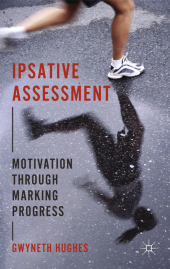 Neuerscheinungen 2014Stand: 2020-02-01 |
Schnellsuche
ISBN/Stichwort/Autor
|
Herderstraße 10
10625 Berlin
Tel.: 030 315 714 16
Fax 030 315 714 14
info@buchspektrum.de |

G. Hughes
Ipsative Assessment
Motivation through Marking Progress
1st ed. 2014. 2014. vii, 226 S. 216 mm
Verlag/Jahr: SPRINGER PALGRAVE MACMILLAN; PALGRAVE MACMILLAN UK 2014
ISBN: 1-349-44335-2 (1349443352)
Neue ISBN: 978-1-349-44335-2 (9781349443352)
Preis und Lieferzeit: Bitte klicken
Ipsative assessment is a powerful new approach that provokes a radical rethink of the purposes and methods of assessment. This book presents a case for partially replacing competitive assessment with ipsative assessment, and it explores the possibilities and the challenges with research evidence and case studies.
1. A Fresh Look at Assessment 2. The Purposes of Assessment: Competition and Social Selection 3. Assessment for Learning: In the Shadows? 4. The Effects of Competition on Assessment for Learning 5. Exploring Ipsative Assessment 6. Making the Case for Ipsative Assessment: Assessment for Learning Revisited 7. Two Case Studies of Ipsative Assessment in Academic Setting 8. A Dual Systems Model of Assessment: Lessons from Doctoral Supervision 9. Leading Innovation and Change in Educational Settings: The Challenges of Assessment Reform 10. Institutional Case Study of Innovation in Assessment 11. Ipsative Assessment as a Feasible Utopia
"Ipsative Assessment provides an insightful look into the philosophies, principles, processes, and realities of assessment in education and beyond. Hughes´s argument in favour of empowering learners and teachers provides a thought-provoking take on the potential and the limitations of assessment that is certain to make this book a favourite with teachers, learners, and educational assessment stakeholders alike." (Paraskevi Mylona, London Review of Education, Vol. 13 (3), December, 2015)
"The take-home message from Ipsative Assessment: Motivation through Marking Progress is that ipsative assessment is not new, but formal institutional systems adopting this perspective are scarce. Therefore, in order to successfully support students´ learning, institutions need to adopt a dual system approach that combines traditional purposes of assessments (e.g., competition) with processes that support scaffolded learning (i.e., ipsative assessment)." - British Journal of Educational Studies
Gwyneth Hughes is Reader in Higher Education at the Institute of Education, University of London, UK. She is a co-author of Learning Transitions in Higher Education (Palgrave Macmillan, 2013).


